Science & Technology
/Knowledge

Condor couple may be tending to first egg in Northern California in a century
A California condor known as Ney-gem’ ‘Ne-chweenkah’ — Yurok for “She carries our prayers” — has been flying to a particular spot deep inside Redwood National Park, near Klamath.
Then she leaves and another — nicknamed ‘Hlow Hoo-let’, or “At last I (or we) fly!” — has been arriving.
Yurok wildlife officials say this ...Read more

Pentagon feud with Anthropic shines light on AI's role in mass surveillance
Anthropic PBC’s clash with the Pentagon is drawing fresh attention to a lightly regulated practice: the U.S. government’s purchase of commercially available information, such as browsing histories and location data, and the growing use of artificial intelligence to analyze it at scale.
U.S. agencies, including the Defense Department, have ...Read more

Outer Banks erosion reveals buried whale, NC group says. 'Stinks to high heaven'
Worsening beach erosion on North Carolina’s Outer Banks is now being blamed for something down right creepy: Digging up a dead whale, according to coastal community leaders.
It’s happening in Corolla and the Corolla Civic Association says the grave is being repeatedly uncovered and recovered at the whims of the tide.
“Approximately four ...Read more
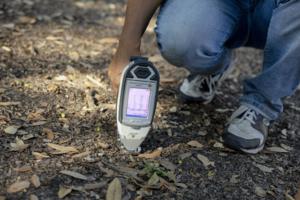
Federal aid for lead cleanup is receding. That's a problem for cash-strapped cities
Tighter regulations and an influx of federal money in recent years have helped communities across the U.S. initiate efforts to clean up lead contamination in soil, drinking water, and older homes. But Congress and the Trump administration have partially rolled back those rules and resources, potentially making it more challenging for cash-...Read more

Iranian drone strikes on Amazon data centers highlight tech's exposure
As the tech industry chases growth in the Middle East through data centers, the companies' infrastructure is increasingly exposed to conflicts in the region.
U.S. tech companies are investing billions of dollars into data centers in the Middle East as companies chase artificial intelligence ambitions and growing need for computing power.
At ...Read more
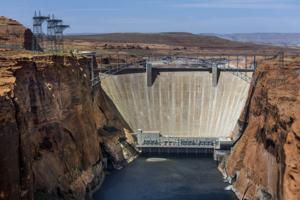
California, Arizona and Nevada press Trump administration to rethink Colorado River water cuts
Leaders of California, Arizona and Nevada are criticizing the Trump administration’s proposals for water cutbacks along the Colorado River, urging it to take a different approach and avoid a court battle.
The three downstream states said in letters to the Interior Department this week that the agency’s preliminary outline of five options ...Read more

Top tech companies sign Trump's pledge to provide their own power for AI data centers
In a ceremony at the White House on Wednesday, executives from seven major tech companies signed a pledge with President Trump to supply their own power for artificial intelligence data centers.
Leaders from Amazon, Google, Meta, Microsoft, xAI, Oracle and OpenAI agreed to the “ratepayer protection pledge” Trump first announced during last ...Read more
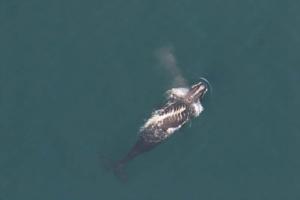
Trump administration looking at repealing East Coast boat speed rule: 'Brutal blow to right whales'
BOSTON — The Trump administration is looking into rolling back an East Coast boat speed rule that whale advocates say would lead to more deadly ship strikes.
The National Oceanic and Atmospheric Administration has proposed amendments to the North Atlantic right whale speed rule from 2008. NOAA is proposing a shift away from mandatory speed ...Read more

NASA now officially has no plans to use new mobile launcher for Artemis
When NASA Administrator Jared Isaacman announced the revamped approach to the Artemis moon program, it was unclear whether the new mobile launcher that has been constructed over the last two years at Kennedy Space Center would ever get used.
A NASA rundown of the reconfigured Artemis launch plans released Tuesday, though, answers that question ...Read more

Tech review: Dangbei DBOX02 Pro is ready for your living room
I love a big TV.
There’s nothing like watching a movie or sporting event on a really big screen, but TVs can get expensive when you’re talking about screens larger than 75 inches.
There comes a price/size where you’ll realize a projector could be a better option, depending on your room setup.
Today we are looking at the Dangbei DBOX02 ...Read more

Apple launches $599 MacBook Neo, threatening Windows PC market
Apple Inc. rolled out the $599 MacBook Neo in its biggest push yet into low-end laptops, aiming to challenge Windows PCs and Chromebooks for budget-minded shoppers.
The machine is $400 less than any new-generation laptop Apple has sold before, coming in well below the now $1,099 MacBook Air. The MacBook Neo will be offered in citrus, silver, ...Read more

Gadgets: Unique headphones
In the crowded headphone market, aside from great sound, products often need another feature to stand out. And that's exactly what the MorningBlues wireless headphones VWS X1 have with their unique, fashionable and personalized detachable 2.2-inch OLED touchscreens on each earcup.
They are promoted by MorningBlues as the world’s first ...Read more

Review: ‘Resident Evil Requiem’ captures 3 eras of a landmark franchise
“Resident Evil” has introduced several heroes across its 30-year history, but its main villain has lived in the shadows. It’s not Albert Wesker, but rather, the man pulling the strings behind the evil corporation Umbrella — Lord Oswell Spencer.
The billionaire virologist has his fingerprints all over the series. He built the zombie-...Read more

Review: 'Dragon Quest' remake a tighter game with cute graphics, better sound
BERLIN — "Dragon Quest" is one of the most successful role-playing series around, particularly in Japan. It's been around for almost 40 years.
Fans of the video game have been waiting for a new title since it was announced back in 2021.
But instead, Square Enix has released a remake of "Dragon Quest VII."
It is significantly streamlined ...Read more
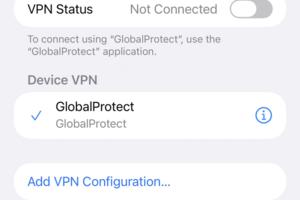
Jim Rossman: VPN 101
This week a reader writes:
"I've been reading a lot lately how VPN can protect your privacy, avoid marketing ploys and help with hacking. At one time, my university provided VPN for us when we were overseas (helped get through the Great Firewall of China), but I have no idea how it might be implemented for private use. Could you address...Read more

Delivery robots have his old job -- and now they've created a new one for him
Charlie Snodgrass used to be a gig driver, delivering burritos and pad Thai around Los Angeles. Today, he handles the robots that do his old job.
He is one of the first of a new class of workers, a robot wrangler paid to care for and train AI-powered bots as they learn to work in the real world.
At 5:45 a.m., in a small warehouse in West ...Read more
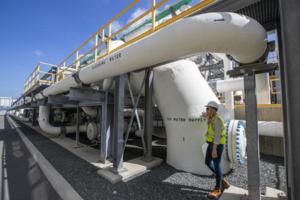
How a California desalination plant could help solve water shortages on the Colorado River
With desert cities like Phoenix and Tucson bracing for their allotments of Colorado River water to be slashed dramatically, San Diego County’s water agency could for the first time sell some of its water to other states by drawing on its ample supplies from the nation’s largest desalination plant.
The San Diego County Water Authority’s ...Read more

NASA finds source of Artemis II problem that forced rollback from the launch pad
NASA announced it had found the source of a helium flow blockage that forced it to roll the Artemis II rocket back from the launch pad at Kennedy Space Center and delay its lunar fly-by mission until at least April.
In an update to its website Tuesday, NASA stated that technicians had gained access to the launch vehicle stage adapter next to ...Read more

How two Big Bear eagles became social media's hottest love story
When Big Bear’s celebrity bald eagle couple’s eggs were eaten by ravens in late January, they didn’t grieve alone.
Thousands had watched Jackie and Shadow on livestream, as they meticulously arranged sticks in their nest high in a Jeffrey pine and nibbled each other’s feathers in preparation for laying. All seemed just dandy until both...Read more

China's new 5-year plan is crucial for world's climate fight
China’s next five-year plan set to be published this week will help dictate how fast the top polluter can cut greenhouse gas emissions and the extent of new support for clean technology sectors, policy settings that are critical to determining the world’s success in tackling climate change.
Policymakers gathering in Beijing from March 5 for...Read more
Popular Stories
- Iranian drone strikes on Amazon data centers highlight tech's exposure
- NASA now officially has no plans to use new mobile launcher for Artemis
- California, Arizona and Nevada press Trump administration to rethink Colorado River water cuts
- Top tech companies sign Trump's pledge to provide their own power for AI data centers
- Trump administration looking at repealing East Coast boat speed rule: 'Brutal blow to right whales'





